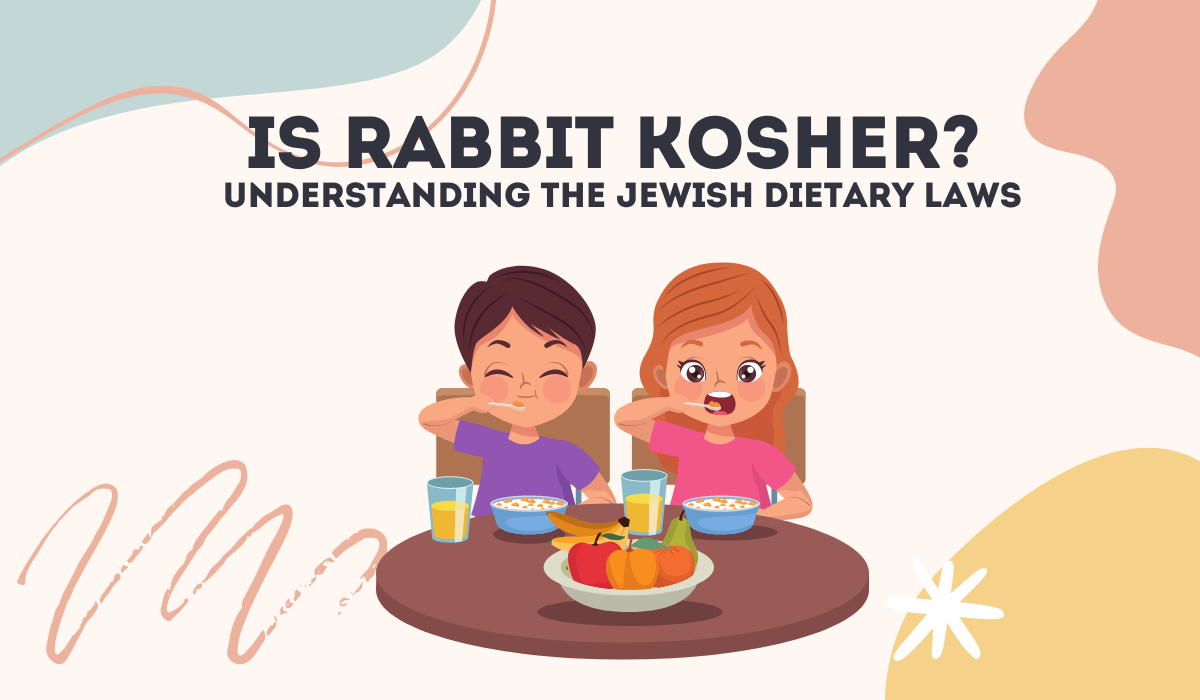Rabbits have been a popular source of food for centuries, and many people wonder whether they are considered kosher or not. Kosher dietary laws are an important part of Jewish tradition, and they dictate which animals are considered clean and fit for consumption. In order to be considered kosher, an animal must meet certain criteria, including having split hooves and chewing its cud.
According to Jewish law, rabbits are not considered kosher animals. While rabbits do chew their cud, they do not have split hooves, which is one of the key requirements for an animal to be considered kosher. This means that consuming rabbit meat is not permitted for those who adhere to kosher dietary laws.
Despite the fact that rabbits are not considered kosher, there are still many cultures and cuisines that incorporate rabbit meat into their dishes. However, those who follow kosher dietary laws must avoid consuming rabbit meat and stick to other types of kosher meat, such as beef, lamb, and chicken, in order to maintain their adherence to Jewish tradition.
What is Kosher?
Kosher refers to the dietary laws and regulations that are followed by Jewish people. These laws dictate what foods are considered acceptable to eat and how they should be prepared. The word “kosher” means “fit” or “proper” in Hebrew.
There are several guidelines that determine whether or not a food is considered kosher. For example, land animals must have split hooves and chew their cud in order to be considered kosher. This means that animals such as cows, sheep, and goats are considered kosher, while pigs and camels are not.
Similarly, fish must have fins and scales to be considered kosher. This means that fish such as salmon and tuna are considered kosher, while shellfish such as shrimp and crab are not.
In addition to these guidelines, there are also rules about how food should be prepared. For example, meat and dairy products cannot be cooked or consumed together. This means that a kosher meal cannot include both a cheeseburger and a glass of milk.
Overall, the kosher dietary laws are an important part of Jewish tradition and culture. By following these guidelines, Jewish people are able to maintain a connection to their heritage and maintain a sense of community with one another.
The Kosher Laws
The Jewish dietary laws, known as kashrut, determine which foods are permitted and which are prohibited for consumption. These laws are based on the Torah, which lists the types of animals that are considered kosher and non-kosher. The kosher laws are not only about what is eaten, but also how it is prepared and served.
The Prohibition of Eating Non-Kosher Animals
The Torah prohibits the consumption of certain animals, which are considered non-kosher. These include animals that do not have split hooves and do not chew their cud, such as pigs, rabbits, and camels. The prohibition also extends to certain types of birds and fish.
According to the kosher laws, consuming non-kosher animals is not only a dietary restriction, but also a spiritual one. It is believed that the act of eating non-kosher food can have negative effects on a person’s soul and spiritual well-being.
The Criteria for an Animal to be Kosher
To be considered kosher, an animal must meet specific criteria. First, it must have split hooves, which means that the hoof is divided into two parts. Second, it must chew its cud, which is a process of regurgitating and re-chewing food.
Examples of kosher animals include cows, sheep, goats, and deer. Fowl, such as chickens and turkeys, are also considered kosher, as long as they are slaughtered according to specific guidelines.
The kosher laws also dictate how animals are slaughtered and prepared. The process, known as shechita, involves a trained individual using a sharp knife to quickly and painlessly sever the animal’s carotid artery and jugular vein. The blood must be drained from the animal before it is prepared for consumption.
The kosher laws are an important aspect of Jewish dietary and spiritual practice. By following these laws, individuals are able to maintain a connection to their faith and culture, while also ensuring that the food they consume is prepared in a humane and ethical manner.
Is Rabbit Kosher?
Rabbits are a common animal in many parts of the world and are often raised for their meat. However, the question of whether or not rabbit meat is considered kosher is a topic of debate among different communities.
Arguments Against Rabbit Being Kosher
One of the main arguments against rabbit being kosher is that it does not have a split hoof. According to Jewish dietary laws, an animal must have a split hoof and chew its cud in order to be considered kosher. Rabbits, along with hares and other lagomorphs, do not have a split hoof and therefore are not considered kosher.
Another argument against rabbit being kosher is that it is not mentioned in the Torah as a kosher animal. The Torah provides a list of animals that are considered kosher, and rabbits are not included in that list.
Arguments in Favor of Rabbit Being Kosher
Despite the arguments against rabbit being kosher, there are some who believe that it is permissible to eat rabbit meat. One argument in favor of rabbit being kosher is that it does chew its cud. While rabbits do not have a multi-chambered stomach like cows and sheep, they do have a cecum, which is a pouch in their digestive system where they ferment and re-ingest their food.
Another argument in favor of rabbit being kosher is that it was consumed by some Jewish communities in the past. For example, in medieval Spain, rabbits were considered kosher and were a popular meat among Jews living there.
Despite these arguments, the general consensus among most Jewish communities is that rabbit is not considered kosher. Therefore, those who follow Jewish dietary laws should not consume rabbit meat.
Alternatives to Rabbit Meat
For those who do not consume rabbit meat due to religious or personal reasons, there are several alternatives available that are considered kosher. Sheep, goats, cows, and domesticated fowl are all acceptable options. These meats are widely available and can be found in most grocery stores.
It is important to note that the preparation of these meats must also adhere to kosher guidelines. For example, meat and dairy cannot be mixed in the same meal, and the meat must be slaughtered in a specific way to be considered kosher.
Aside from meat options, there are also many vegetarian and vegan alternatives that can be used in place of rabbit meat. Tofu, tempeh, and seitan are all high-protein options that can be used in a variety of dishes. Lentils, beans, and chickpeas are also great sources of protein and can be used in soups, stews, and salads.
When it comes to flavor, many people find that mushrooms can be a great substitute for meat. Portobello mushrooms, in particular, have a meaty texture and can be grilled or roasted to add depth and flavor to a dish.
Conclusion
Based on Jewish dietary laws, rabbits are not considered kosher animals. This is because they do not have split hooves and they do not chew their cud. Both of these characteristics are required for an animal to be considered kosher.
While rabbits do chew their cud, they do not have a split hoof like cows, sheep, or goats. Additionally, they do not have a digestive system that is considered to be kosher according to Jewish law.
It is important to note that not all religions or cultures have the same dietary restrictions as Judaism. In some cultures, rabbits are considered a delicacy and are consumed regularly. However, for those who follow Jewish dietary laws, it is important to adhere to the guidelines set forth in the Torah.
It is important for individuals to understand the dietary restrictions of their religion or culture and to make informed choices about the foods they consume.
FAQ
Why are rabbits halal but not kosher?
Rabbits are considered halal (permissible) in Islamic dietary laws because they are herbivores and have a cloven hoof. In contrast, in Jewish dietary laws, or kosher laws, mammals must both chew their cud and have cloven hooves to be considered kosher. Since rabbits are not ruminants and do not chew their cud, they are not considered kosher.
Is a duck kosher?
In Jewish dietary laws, or kosher laws, birds must meet certain criteria to be considered kosher. According to these laws, a bird must be a kosher species and have a specific diet and digestive system. Ducks are not considered a kosher species under these laws, as they do not have a crop, which is a pouch-like organ used for food storage and initial digestion in birds.
Why are hares not kosher?
Hares are not considered kosher in Jewish dietary laws because they have a digestive system that is similar to that of a rabbit, which is not kosher. Specifically, hares and rabbits are not ruminants and do not have a divided hoof, which are two key criteria for animals to be considered kosher. interpretations.



